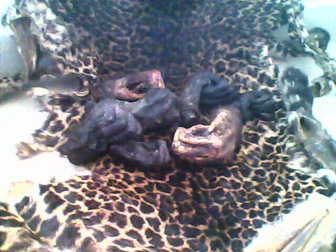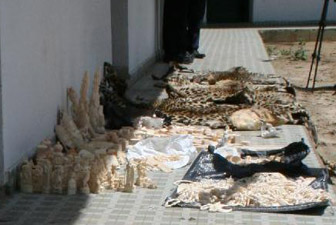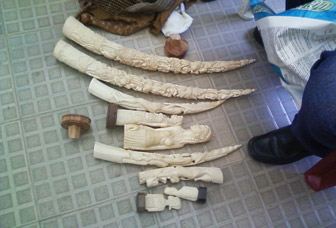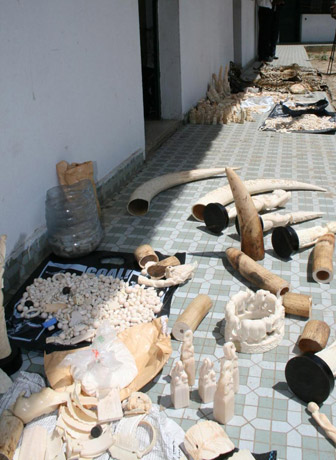An interview with Naftali Honig, director of Projet d’Appui à l’Application de la Loi sur la Faune in Republic of Congo.
The bushmeat trade in the Congo basin has been widely publicized but poorly addressed. While fines and sentences exist for wildlife trafficking, they have traditionally been poorly enforced due to corruption, poor governance, and attentions focused on other priorities. Major traffickers, who tend to be rich and well-connected, trade with impunity, knowing that a well-placed bribe or a phone call can get them off with little more than a slap on a wrist.
But the days of privilege may be drawing to a close in Republic of Congo thanks to the efforts of PALF [Projet d’Appui à l’Application de la Loi sur la Faune], a Brazzaville-based NGO which is working to build the capacity of Congolese authorities to enforce wildlife laws. In the process, PALF is helping root out corruption and raise awareness of the plight of the country’s increasingly threatened wildlife, including forest elephants, big cats, chimps, and gorillas.
 Confiscated leopard skin and the gorilla hands in Pointe-Noire (photo by Naftali Honig). Honig says that police in Republic of Congo often don’t have equipment like cameras for documenting seizures. |
“Our approach is to assist in the application of the wildlife laws so that people will stop commercializing illegal wildlife products and quit feeling immune to punishment,” PALF Director Naftali Honig told mongabay.com. “More concretely, we work with investigators and local authorities to catch criminals in the act and then follow the legal proceedings to ensure that they don’t use a phone call, a bribe, or anything of that nature to illegitimately get themselves off the hook.”
PALF is also working on education and outreach through the media, making people aware that there are consequences for trafficking wildlife.
“Disseminating information to promote awareness of environmental issues is always an important aspect of conservation,” Honig said. “Our way of doing that is giving the public legal background information.”
During a January 2010 interview with mongabay.com, Honig discussed PALF’s efforts and the challenges of enforcing wildlife laws in Central Africa.
AN INTERVIEW WITH NAFTALI HONIG
Mongabay:
What is PALF’s approach to conservation?
Naftali Honig:
The application of wildlife laws is one of many tools in conservation, and is surprisingly new in Central Africa. With existing wildlife laws that, on paper, look like a formidable means of protection for Congo’s fauna, the application of these laws can really affect the response of those breaking them. There are many places within the legal system where the law can be evaded in one way or another, so all too often criminals feel at ease breaking the national law when it comes to wildlife trafficking. Our approach is to assist in the application of the wildlife laws so that people will stop commercializing illegal wildlife products and quit feeling immune to punishment. More concretely, we work with investigators and local authorities to catch criminals in the act and then follow the legal proceedings to ensure that they don’t use a phone call, a bribe, or anything of that nature to illegitimately get themselves off the hook.
Mongabay:
What led you to get involved in this line of work?

Contraband wildlife products in Brazzaville (photo by PALF). |
Naftali Honig:
I’ve loved animals since I was a child, but at university, I studied ethnobotany and considered a future in medicine. My thinking started to move more and more towards conservation though while traveling in Asia and Africa. My history in conservation starts with investigative journalism, mostly with regard to chimpanzee conservation, often involving illegal traffic. I also spent a year living in Conkouati Douli National Park in Congo, working for the HELP-Congo chimpanzee sanctuary and release project. I cannot describe the way I feel when I am walking amidst forest elephants or observing a group of gorillas or following a party of chimps, or simply sitting under the canopy listening to the soundtrack of birds and insects. I fell in love with the forest. On a vacation, I went to visit Ofir Drori, founder of LAGA in Cameroon, and his movement greatly appealed to me as a tool for conservation. The courage and integrity I saw in LAGA gave me a lot of faith as well. It would be more pleasant to work in the forest, but right now I feel as though I am needed outside the forest. I am really grateful for the wonders of the natural world, and today gratitude means understanding and protecting from the excesses of humanity; wildlife law enforcement is a tool that can help.
Mongabay:
What are the major trafficking activities in the region? Who is involved in the trade?
Naftali Honig:
In Central Africa, illegal bushmeat commercialization is still devastating wildlife populations. The region’s ivory trade is also surprisingly active. Orphaned chimpanzees and gorillas (by-products of illegal bushmeat hunting themselves) are still illegally sold as pets. Leopard skins are traded, sometimes even openly, despite laws theoretically offering high levels of protection and steep penalties for all levels of the trade, from hunters to middlemen to salesmen. All the different trafficking activities have the potential to exist both nationally and internationally. In recent months, our cases have demonstrated the diversity. To cite a few examples, three men were caught smuggling ivory across the Congo River from Kinshasa, DRC into Brazzaville; a woman citizen was caught selling a leopard skin and gorilla hands in a local market; currently, our legal team is working on a case involving a Chinese man caught in possession of ivory. We understand that there is still high demand in Asia for ivory, so such cases, rare as they are to see in the courts now, may be on the rise. An important aspect of PALF is that even if the person involved in the trade holds a high position or is a foreigner, national law still applies and so we want to make sure that big players do not see themselves as being above the law because of connections or financial capability to bribe their way out of punishment.
Mongabay:
What are the some of the challenges of working in Congo? Are there difficulties in keeping convicted traffickers in jail after they are sentenced?
 Seized ivory in a police station in Pointe-Noire. Photos by Luc Mathot, founder of PALF. |
Naftali Honig:
The difficulties begin long before the traffickers are sentenced. From the moment they are arrested, the traffickers will attempt to take advantage of the weaknesses in the legal system. They might try and use influence to not be held while on trial, they might try to bribe any number of individuals responsible for treating some aspect of the case, they might try to disappear while on trial and hope that their case is just forgotten about. The list of potential irregularities is virtually endless- all this contributes to a punitive system that barks but doesn’t bite. The challenge is to make it bite when the law has been broken, transcending corruption no matter who the criminal is. Of course, the novelty of this type of project also makes the work challenging as well.
Mongabay:
How is wildlife law enforcement currently funded in Congo?
Naftali Honig:
PALF itself is funded by foreign donors, and for the time being, there seems to be a lot of interest in wildlife law enforcement. The movement started in Cameroon with the Last Great Ape Organization (LAGA), whose years of experience have continued to demonstrate how deep wildlife trade actually goes. The Congolese government partially supports certain aspects of wildlife law enforcement in a range of projects, but for the time being the truth of working in poorer nations is that conservation is not top priority, so support will have to continue to come from the outside. PALF is very budget conscious, following the precedent set by LAGA. Also, our form of activism goes even beyond wildlife because we are also fighting corruption, which as we can see is such a massive impediment to conservation. So broadly, I think the idea is positive enough that it will hold the attention of donors wanting to see change in a system under which conservation has suffered unnecessarily in the past.
Mongabay:
What is the role of public outreach in reducing the wildlife trade?
 Seized wildlife products in Brazzaville (photo by PALF). |
Naftali Honig:
Disseminating information to promote awareness of environmental issues is always an important aspect of conservation. Our way of doing that is by seeking out journalists in the various organs of the media who would be interested in publicizing the cases PALF works with. Now investigators are coming back saying that the people who used to be involved in some aspect of wildlife trade are now fearful of the law, because they’ve seen that someone’s been arrested on TV, or that someone’s been convicted to a significant prison term. We have found that there is a significant interest in putting out information about the wildlife trafficking cases. We started out 2010 with 18 pieces in the Congo’s written media, 18 pieces on the radio, and one piece on national television, all covering some aspect of the cases we followed in the month of January. This number of pieces covering cases PALF is affiliated with in the Congolese media is about average for any given month.
Mongabay:
How can people in Europe and the United States help your efforts?
Naftali Honig:
Some of the illegal wildlife trade goes to European markets, so people can report these instances to the appropriate authorities. If traffickers are caught in Europe and the United States with illegal wildlife products, there is a chance to catch others involved at both ends. People can lobby and tell their governments to support wildlife law enforcement. People can always send us questions or information about related issues at naftalihonig (at) palf-enforcement.org as well, as wildlife law enforcement is a broad area and so there’s plenty of room for good ideas.
PALF (an affiliate of The Last Great Ape Organization – LAGA)







